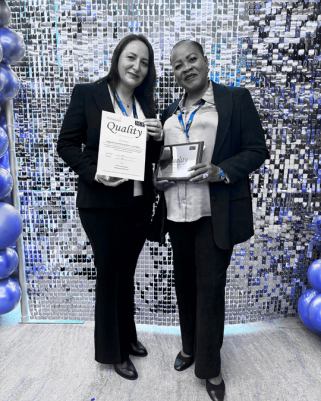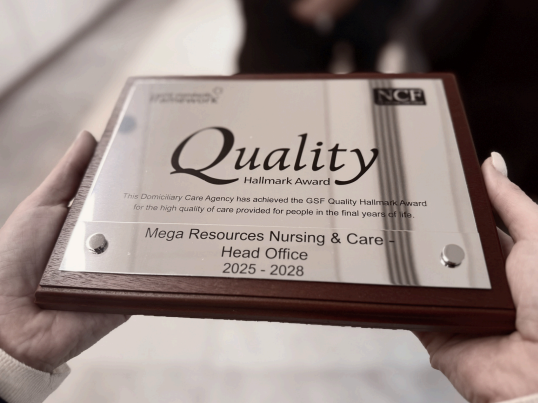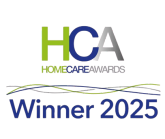Palliative and end-of-life care are both characterised by a compassionate approach aimed at enhancing quality of life for individuals with serious or life-limiting illnesses. End-of-life care provides treatment and support during the final stage of a person’s life and prioritises their dignity, comfort and emotional well-being. Palliative care can be provided at any stage of a severe illness, even alongside curative treatments. These types of care address physical symptoms and the emotional, social, and spiritual needs of service users and their families. Receiving this care at home is often preferred because it allows service users to stay in familiar surroundings, maintain their dignity and spend their final moments where they feel most comfortable. Additionally, home-based care has been shown to reduce hospital stays and improve overall quality of life. A person-centred approach is fundamental to this, so the care provided is tailored to the unique needs, values and preferences of the service user. This approach empowers them to actively participate in decisions about their care which promotes a sense of control and independence at a time when they feel this is being lost.
Our palliative home care focuses on delivering care and support to individuals and their families during difficult circumstances. We aim to provide the highest quality assistance through our services, ensuring comfort, support, and personalisation for each individual at the most critical time.
| Reduced Package of Care (POC) | 47% |
| Discharged with No POC | 38% |
| Taken Over By Reablement Team | 5% |
| Admitted into Hospital | 5% |
| Taken Over By Reablement Team | 3% |
| Moved to Nursing/Care Home | 2% |
In Bedfordshire, under a sub-contract
with ELFT, we provide rapid response
and reablement homecare services
We have been awarded zonal partners
and shadow strategic partners with
Oxfordshire County Council.
We are also preferred and approved
providers in Central Bedfordshire &
Bedford Borough.
Reach out today for a free consultation - we are here to support & guide you
Delivering care at home allows loved ones to remain in familiar surroundings, where they feel most secure and supported. This environment fosters emotional well-being, preserves daily routines, and reduces anxiety. It also helps maintain your loved one's dignity and autonomy throughout the various stages of end of life care.
At Mega Care, we align with the NHS’s 5 Priorities of End of Life Care ensuring that families can expect:
Your loved one will need to have been seen by a professional regularly. If it’s believed that the end is very near, this will be explained clearly and sensitively to you and your family.
Open and Honest Communication Our care team will always speak with compassion and honesty, ensuring that you and your family are fully informed.
You and your loved one will be included in decisions about care and our role in upholding processes around treatment.
The needs of your family and those closest to you will be recognised and supported as much as possible.
A personalised and unique care plan will be agreed with you and delivered with dignity, respect and compassion.
Home-based care also means families can be supported in accessing the right resources, including equipment needed for palliative care at home, such as hospital beds, mobility aids and oxygen support. We also assist with prescribed palliative care medications to help relieve pain, step in to manage distressing symptoms and ensure comfort during the final days.
Together, these elements create a compassionate, holistic approach that supports not only the person receiving care but also the family walking alongside them.
We're here to support you every step of the way. Whether you have questions about our services or need assistance in finding the right care for your loved one, our compassionate team is ready to help.
We understand that this journey can be challenging and we're committed to providing you with the information and support you need.




We are proud to be accredited with the Gold Standards Framework Quality Hallmark Award, the UK’s leading benchmark for high-quality palliative and end-of-life care. Recognition from GSF confirms we exceed the national best practice standards in training, care delivery and sustained performance across hospital and community settings.
The Gold Standards Framework is a charitable, evidence-based service improvement programme that has empowered health and social care providers across all settings to deliver ‘gold standard’ care for over 25 years. It promotes earlier identification, advance care planning, coordinated multi-disciplinary delivery and person-centred practice. Originally developed in England by GPs and palliative specialists in the early 2000's, GSF now supports care homes, hospitals, hospices, community and domiciliary services, prisons and integrated care systems.
We completed Gold Standards Framework’s training programme
tailored to community and domiciliary care settings.
This included interactive live sessions and workshops, implementation tools, resources and reflective learning covering GSF’s ‘seven key tasks’ which spans identification, communication, symptom management, advance care planning, leadership and sustainability.
We completed Gold Standards Framework’s training programme
tailored to community and domiciliary care settings.
This included interactive live sessions and workshops, implementation tools, resources and reflective learning covering GSF’s ‘seven key tasks’ which spans identification, communication, symptom management, advance care planning, leadership and sustainability.
We completed Gold Standards Framework’s training programme
tailored to community and domiciliary care settings.
This included interactive live sessions and workshops, implementation tools, resources and reflective learning covering GSF’s ‘seven key tasks’ which spans identification, communication, symptom management, advance care planning, leadership and sustainability.
We completed Gold Standards Framework’s training programme
tailored to community and domiciliary care settings.
This included interactive live sessions and workshops, implementation tools, resources and reflective learning covering GSF’s ‘seven key tasks’ which spans identification, communication, symptom management, advance care planning, leadership and sustainability.

The Gold Standards Framework is more than an accreditation, it is a commitment to continual growth, reflection and excellence in care
By embedding its principles into everything we do, Mega Nursing & Care ensures that every person we support receives not only safe and effective care but also experiences dignity, respect and compassion at every stage of their journey.
Reach out today for a free consultation - we are here to support & guide you

In 2025, we were honoured with the Palliative & End-of-Life Award at the Home Care Awards. This national recognition celebrates organisations that deliver outstanding person-centred end-of-life care and support to individuals and their families.
Winning this award reflects the dedication of our entire team, the compassion embedded in our daily practice and the impact of our commitment to frameworks like the Gold Standards Framework. It is a testament to the high standards we uphold and ensures every service user experiences dignity, comfort and quality of life at one of the most important times on their journey.





"Lorem ipsum dolor sit amet consectetur adipiscing elit. Quisque faucibus ex sapien vitae pellentesque sem placerat. In id cursus mi pretium tellus duis convallis. Tempus leo eu aenean sed diam urna tempor. Pulvinar vivamus fringilla lacus nec metus bibendum egestas. Iaculis massa nisl malesuada lacinia integer nunc posuere. Ut hendrerit semper vel class aptent taciti sociosqu. Ad litora torquent per conubia nostra inceptos himenaeos".
Palliative care is specialised support for people living with serious or life-limiting conditions. It focuses on managing symptoms such as pain, breathlessness and fatigue, while also offering emotional, social and spiritual support for both the individual and their family
Not always. Palliative care can be provided alongside ongoing treatments and may last for weeks, months or even years. It is about improving quality of life and comfort at every stage of a serious condition, not just in the final days.
The length of palliative care depends on the individual’s condition and needs. Some people receive palliative support for a short time, while others benefit from it over months or years. At Mega Care, our team adapts our services as your needs evolve.
When receiving palliative home care services, you can expect a personalised plan tailored to your loved one. This may include professional help with medications, symptom management, access to essential equipment like hospital beds or oxygen support and emotional or spiritual guidance for the whole family.
Palliative home care means bringing expert care into the comfort of your loved one’s home. It allows them to remain in familiar surroundings, preserves their dignity and reduces unnecessary hospital admissions while ensuring their symptoms are managed with compassion and professionalism.
End-of-life care symptoms often include pain, breathlessness, fatigue, restlessness and anxiety. Our carers and nurses are trained to manage these effectively, while also supporting their emotional and spiritual well-being.
End-of-life care planning is the process of agreeing on a personalised plan for your loved one’s final stage of life. This ensures their wishes are respected, their comfort is prioritised, and their family feels supported with clear guidance and compassionate care.
A Personalised Alternative to Residential/Hospice Care
For many families, the thought of moving a loved one into a residential or hospice setting can feel overwhelming. At Mega Care, we understand. We specialise in providing **Home-Based Palliative and End-of-Life Care**. This means your loved one can receive the same level of professional support in the place they know best and surrounded by familiar comforts, family and cherished memories. Being at home means they can keep routine, enjoy treasured spaces, and spend time with family whenever as long as possible. We partner with you, the community and health & social care professionals to make care of managing symptoms, providing emotional support and ensuring their dignity every step of the way.
| Home-Based Palliative Care | Residential / Hospice Care | |
|---|---|---|
| Environment | Care is delivered in familiar surroundings, ensuring your loved one has the comfort of their own bed, chair and routines, and can maintain their sense of home | Care is delivered in a clinical or hospice setting with shared or private rooms |
| Family Access | Family can be present anytime with no visiting limitations | Visiting hours are likely to apply, depending on the facility |
| Independence & Routine | Everyday habits and personal routines are maintained | Set schedules for meals, medication, and visits |
| Emotional Wellbeing | Your loved one is surrounded by memories, pets, familiar scents and sounds. This is proven to ease anxiety. | A supportive environment but unfamiliar surroundings tend to take adjustment and time to settle |
| Level of Clinical Support | One-on-one care is delivered by trained carers or nurses at home with clinical oversight | 24/7 on-site nursing team, with access to medical equipment |
| Personal Choice & Dignity | Care is personalised to the individual's lifestyle, preferences and cultural needs | Care tends to heavily follow hospice protocols |
| Cost Structure | Often more flexible with tailored packages based on level of need, not itemised fees | Typically charged per room per day, plus additional care costs |
| Family Role | Family may remain more involved in daily life and emotional support | Staff take a larger role in daily care, and the family visits in mainly for visits |
| Best For... | Those who wish to stay at home, maintain normality and be supported by family | Those who need intensive, round-the-clock medical monitoring and equipment on site |
Reach out today for a free consultation - we are here to support & guide you
~ Chloe D. - Granddaughter of Service User
Our Health Care Assistants undergo the highest standard of comprehensive training in medical skills, equipment use, emergency response, patient education, communication, infection control, and cultural competence.
All completed training is signed off by our Advanced Nurse Practitioner
Our service runs 7am-10pm daily, including weekends, with 24/7 on-call coverage and a single point of access for all referrals.
By collaborating and partnering with various healthcare providers who are already involved in community-based care, this service aims to create integrated, multi-disciplinary care pathways
This allows for smooth care transitions, sharing of information and assessments, and a comprehensive, coordinated approach to treating patients intensively in their home environment while avoiding unnecessary hospital admissions.
The Gold Standard Framework (GSF) is a widely used training program and accreditation process focused on enabling high- quality delivery of palliative and end-of-life care, both in hospitals and community/home settings
We aim to ensure our clinical teams, protocols, and care pathways meet best practice standards for providing comprehensive, compassionate palliative and end-of-life care to patients being treated at
